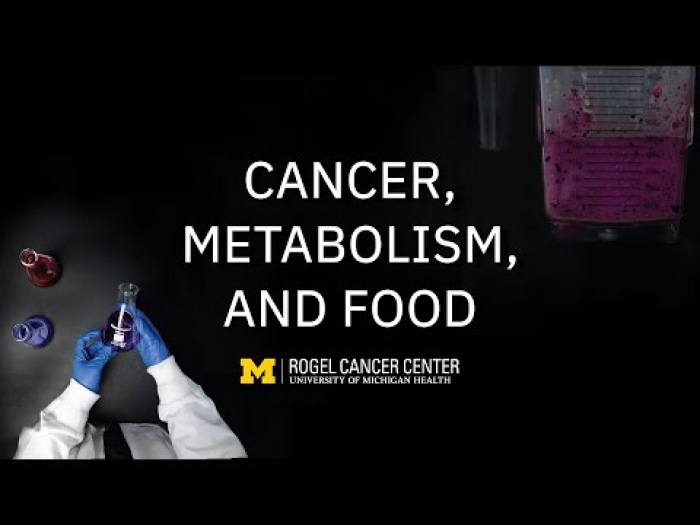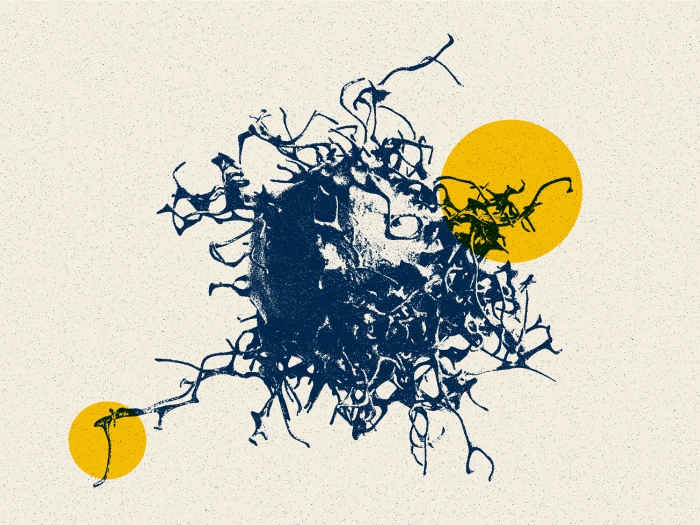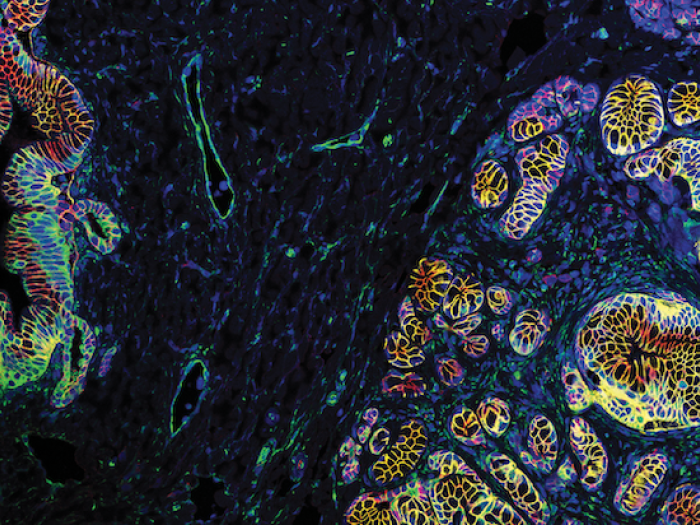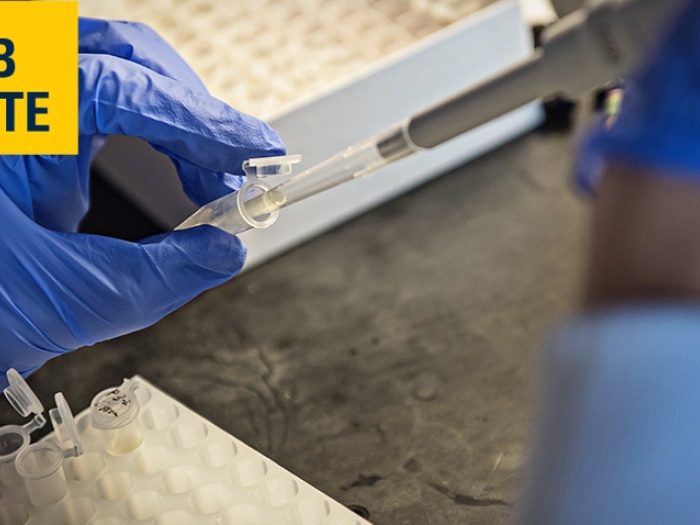Why the key to a robust research program and responsive care lies within collaboration
1:41 PM
Author |

After 15 years of running a lab at the Rogel Cancer Center, and now co-director of the newly appointed Rogel and Blondy Center for Pancreatic Cancer, Marina Pasca di Magliano, Ph.D., has become one of the world’s leading researchers on pancreatic cancer.
She and her collaborators at the center run a team of researchers, including postdoctoral fellows, clinical fellows, graduate and undergraduate students, who study how pancreatic cancer develops and interacts with the tumor microenvironment to grow and resist treatment.
They examine the disease from a genetic, metabolic and immune perspective, taking a multi-disciplinary approach to determine which factors contribute to the disease’s aggressive nature.
And now they have the funding and support of a $50 million gift from Richard and Susan Rogel to create the Rogel and Blondy Center for Pancreatic Cancer.
The center will help U-M’s team accelerate translational research and clinical trials, and will expand access and options for patients.
The center will be co-led by Pasca di Magliano, Costas Lyssiotis, Ph.D., and Timothy Frankel, M.D.
Pasca di Magliano is quick to point out that her lab doesn’t work in isolation.
As part of the Rogel and Blondy center, her lab is a vital piece of a dynamic ecosystem of basic scientists and clinicians who share data and ideas to learn about and ultimately attack the disease.
Here, Pasca di Magliano, Maud T. Lane Professor of Surgical Immunology, discusses the collaboration that makes Rogel’s pancreatic cancer team unique:
How has Rogel cultivated such an expertise in pancreatic cancer?
There’s a combination of factors, one being the coordinated engagement of basic science researchers, translational researchers and many clinicians who are actively involved in research.
Another thing that might seem simple but makes a huge difference: many of us have labs next to each other, on the 6th floor of the Rogel Cancer Center.
It allows for an exchange of ideas, joint mentoring of trainees and a lot of collaboration.
This connection is further catalyzed by our working group meetings that happen every Friday morning and have been going on for years.
I travel around the country quite a bit to give talks and of the many other places with multiple researchers who study pancreatic cancer, I don’t know of any other place that has a weekly joint lab meeting that is well attended and interactive.
Our group involves more than 10 laboratories across multiple departments.
In addition, we ran as a hybrid meeting even before the pandemic, with collaborators from the University of Western Ontario and Henry Ford Health.
With everybody working together, we've been able to work on larger, high impact projects that would have been above the ability of any one laboratory.
We have proven our weight by successfully competing for funding, including multiple R01 grants and collaborative grants such as a U01 that is part of the PSRC consortium and a U54 that is part of the TBEL Consortium and involves investigators at MD Anderson and Johns Hopkins.
With this new gift from the Rogels, we will be able to realize the potential of the ecosystem we have created.
While effective, we have been limited by the constraint that typically impedes science, non-restricted research and clinical financial support.
We will build on our research successes, further integrate the translational pipeline to bring in more exciting clinical trials, recruit at all levels and expand our clinical support infrastructure.
It takes everybody being willing to realize they can’t always be first.
It’s a shared mindset of, “It’s not all about me. It’s about the research, training and patients.”
I do think the fact that we have so many clinicians involved in research is part of our success, because they are directly involved in patient care.
That helps us keep in prospective that everything we do is about patients, about preventing, detecting and treating pancreatic cancer.
We don’t want to lose that perspective.
Our joint group of physicians and researchers helps us keep the patients front and center.
Based on yours and your Rogel colleagues’ work, where do you see pancreatic cancer research going? Is there an area of focus that might yield the most information or unlock the most potential?
The research is moving toward a more personalized oncology approach, really understanding how each tumor is different and how their tumors change during treatment.
We have to respond to each patient’s disease, not just initially but throughout treatment.
A key source of new understanding will be new trials that focus on longitudinally sampling of tumors to detect how tumors respond to treatment and understand the avenue of recurrence.
At the same time, it will be important to get a sense of a patient’s status over the course of their treatment through blood samples.
SEE ALSO: Rogel Cancer Center receives $50M gift to revolutionize pancreatic cancer care, research
This area of research is different from biomarker research.
Instead of comparing a patient to a whole sample population, you follow the individual patient over time, throughout their treatment and after.
It can help us pinpoint when they stop responding to treatment or when they’ve developed resistance.
We’re also working toward a combination of a metabolism and immunity approach, especially through examining mutant K-Ras, the key oncogene of pancreatic cancer that regulates the tumor microenvironment The ultimate goal is to get an immune response to the tumor.
I strongly believe that’s the only way we will get long term control over the disease.
There’s a lot of data from people who do survive a long time and have mounted an immune response to cancer.
But it just happened on their own.
We want to know how to optimize that. How can we get more patients to develop that immunity?
What does a center of excellence mean to you? What elevates a research institution to being a destination for patients?
Obviously top-notch clinical care, as well as comprehensive care.
The lab-to-clinic pipeline is important.
We have the ability for patient samples to be used in lab research, then the knowledge we gain in the lab goes back to oncologists, who can bring that knowledge to other patients.
It’s also vital to have a robust clinical trial program.
Our team at the Rogel is part of an initiative called Precision Promise, which is led by the Pancreatic Cancer Action Network.
It’s a flexible way to have patient-specific clinical trials here, so patients can be enrolled in whatever protocol is best for them.
Otherwise, we would offer just one trial here, and if patients did not qualify, they would be excluded from research.
It will us to increase the number of patients that enter clinical trials for pancreatic cancer.
How do you interpret the idea of following the science in the context of pancreatic cancer research?
I tell my students all the time and want them to understand that, in research, we try new things and will probably be wrong… and probably a lot of the time.
But we train ourselves to follow the science and go where the data takes you.
We had a grant from the American Cancer Society that was initially meant to study the role of regulatory T cells, which are inhibitory immune cells, and it ended up funding tumor sequencing work instead.
We had this well-crafted hypothesis, and in some ways, it was a boring idea: You take away the cells that inhibit the immune response, the immune system gets activated and the tumor goes away.
Well, what actually happened when we did this in mice was that the disease got worse.
And we couldn’t make sense of it.
It took us a long time to figure out what was happening.
We discovered that if you take away regulatory T cells, you end up with a cascade of changes in the tumor microenvironment, from all the cells in the tumor, not just the cancer cells.
Bottom line, from this study we learned that if you block the immune system, it is flexible and rewires to allow the tumor to survive.
It was a finding that initially perplexed us, and that we could have just brushed under the rug and said, “It doesn’t work, let’s move on.”
Instead, we knew this was what we really had to pursue and understand.
It’s one of my favorite papers from the lab.
What do you want people to know about the pancreatic cancer working group that they might not know?
We’ve been extremely successful with developing trainees and junior faculty.
They’ve received major grants and professorships and have created their own independent labs.
Graduate students have gone have secured top postdoctoral positions, and our fellows have earned prestigious positions in industry and academia.
In fact, three of our recent postdoctoral trainees, Halbrook, Steele and Nwosu, obtained K99/R00 grants from NCI and obtained tenure track, or equivalent, faculty positions at the University of California Irvine, Henry Ford health Systems/Michigan State University and Cornell University.
A former clinical fellow, Dr. Carpenter, is now an assistant professor in Internal Medicine at the University of Michigan and a key member of the team.
These trainees are now our colleagues.
They are the next generation.
Training is key to what we do.
We’d also like to highlight that we have a strong emphasis on diversity.
Our labs are incredibly diverse, including nationality, race, age, background, geography and include many first-generation college students.
We have to have a strong commitment to career development. The future of research depends on it.
Sign up for Health Lab newsletters today. Get medical tips from top experts and learn about new scientific discoveries every week.
Sign up for the Health Lab Podcast. Add us wherever you listen to your favorite shows.

Explore a variety of health care news & stories by visiting the Health Lab home page for more articles.

Department of Communication at Michigan Medicine

Professor
Want top health & research news weekly? Sign up for Health Lab’s newsletters today!





